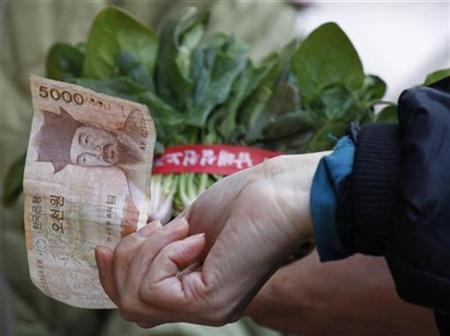South Korea Inflation Eases to Two- Month Low in February
Central bank keeps interest rate unchanged at 2.75%

South Korea's inflation has declined unexpectedly to a two-month low in February, allowing space for the central bank to go for further monetary easing measures including lower interest rates to spur economic growth.
Inflation rate edged down to 1.4 percent year-on-year in February from 1.5 percent in January, according to data from Statistics Korea. Economists were expecting the rate to increase to 1.7 percent.
February was also the fourth straight month in which consumer price growth has remained in the one percent range since November.
The inflation rate, which came down due to weak domestic demand and the won's appreciation is still below the country's inflation target band of 2.5 to 3.5 percent and the bank is likely to cut interest rate further to boost economic activity. The benchmark interest rate was kept unchanged at 2.75 percent in February for the fourth straight month.
In February, core inflation that excludes energy and food prices rose t o 1.3 percent from 1.2 percent in the previous month.
Prices of fresh food including fruits and vegetables rose 7.4 percent in February compared to a 9.3 percent growth in February.
Factory product prices rose 0.7 percent over the same period compared to the previous month's 1.3 percent gain. Meanwhile, the prices of oil-related products declined 1.9 percent following a 0.6 percent decline in January. Electricity, tap water and heating gas costs increased 4.2 percent.
On a monthly basis, inflation declined to 0.3 percent from January's 0.6 percent.
The eurozone debt crisis and lower demand from China have hurt South Korea's export-oriented economy in 2012 with GDP growth slowing down to 2 percent, the slowest rate in three years. In 2011, the country saw its economy growing by 3.6 percent.
Due to the uncertainties in the global economy, the central bank has cut the country's economic growth forecast for 2013 to 2.8 percent from 3.2 percent projected earlier.
The won's appreciation continued to curb import price growth and demand-side inflationary pressures. The currency, which was the second-best performer among 16 major currencies tracked by Bloomberg has risen 2.9 percent against the dollar over the past year.
© Copyright IBTimes 2025. All rights reserved.






















